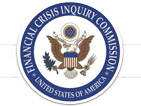 It's not often you can read an entire bestseller online for free. But the Financial Crisis Inquiry Commission report, chaired by former California state treasurer, gubernatorial candidate, and native Sacramentan Phil Angelides, is currently No. 19 on the New York Times Paperback Nonfiction Best Seller list. Last week it debuted at No. 10.
It's not often you can read an entire bestseller online for free. But the Financial Crisis Inquiry Commission report, chaired by former California state treasurer, gubernatorial candidate, and native Sacramentan Phil Angelides, is currently No. 19 on the New York Times Paperback Nonfiction Best Seller list. Last week it debuted at No. 10.
The 10-member commission was created by an act of congress and signed into law by President Obama in 2009. Its charge was to "examine the causes, domestic and global, of the current financial and economic crisis in the United States." That crisis is widely considered to be the worst since the Great Depression and one that led into the vicious recession that we are still feeling the effects of.
Angelides was a guest on Forum today, archived here, talking about the commission's final report. Among other topics, Angelides answered charges by Republicans that the report is a political document reflecting a pre-existing narrative the Democrats on the panel believe. The final report was adopted by a vote of 6 - 4, with the four Republican commissioners issuing two dissenting views among them, another indication of the tremendous partisan divide that exists not only on ways to tackle the economy now and in the future, but also on how to interpret the problems of the past.
To cut to the chase of the report, take a look at its conclusions, outlined here:
- We conclude widespread failures in financial regulation and supervision proved devastating to the stability of the nation’s financial markets.
- We conclude dramatic failures of corporate governance and risk management at many systemically important financial institutions were a key cause of this crisis.
- We conclude a combination of excessive borrowing, risky investments, and lack of transparency put the financial system on a collision course with crisis.
- We conclude the government was ill prepared for the crisis, and its inconsistent response added to the uncertainty and panic in the financial markets.
- We conclude there was a systemic breakdown in accountability and ethics.
For a highly listenable, in-depth examination of the financial crisis, check out This American Life's "The Giant Pool of Money," from 2008.